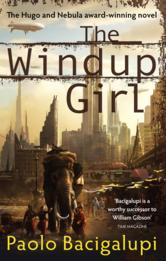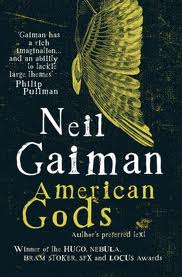 Paolo Bacigalupi has crafted a superb post-apocalyptic political thriller. The Windup Girl is set in a future Thailand where global warming has resulted in dangerously high sea levels – whole cities have been swallowed by water and levees are all that protect Bangkok from being completely flooded. Many crops have become extinct through plague and genehack weevils, due to calorie companies genetically modifying crops. Illnesses then passed from the infected crops to humans – blister rust, cibiscosis – have become worldwide epidemics. These epidemics are now largely under control but any new outbreak threatens the entire world with irreversible destruction. If that wasn’t enough the world’s fossil fuels have run out, and all power is generated using simple kink springs.
Paolo Bacigalupi has crafted a superb post-apocalyptic political thriller. The Windup Girl is set in a future Thailand where global warming has resulted in dangerously high sea levels – whole cities have been swallowed by water and levees are all that protect Bangkok from being completely flooded. Many crops have become extinct through plague and genehack weevils, due to calorie companies genetically modifying crops. Illnesses then passed from the infected crops to humans – blister rust, cibiscosis – have become worldwide epidemics. These epidemics are now largely under control but any new outbreak threatens the entire world with irreversible destruction. If that wasn’t enough the world’s fossil fuels have run out, and all power is generated using simple kink springs.
Anderson Lake secretly works for AgriGen, an American calorie company, searching for food crops thought to long be extinct now occurring naturally in Thailand, in order to copy them, bioengineer them a little, and then trademark them. The calorie companies are back to their old tricks. And they’ll do anything to gain access to the Thai seed bank – their collection of untouched, natural crop samples. But the Thai government keeps it secret. They don’t trade with the outside world. They’re terrified the cycle of bioengineered crop plagues will start anew, and this time the world won’t recover.
Hock Seng works for Anderson Lake’s cover company, a kink spring factory, slowly embezzling from Lake, biding his time until he can steal the company’s new kink spring technology and make a fortune on the black market.
White shirts police the city and the docks, including the fearless Captain Jaidee and his unsmiling partner Kanya.
And in the midst of all this a windup girl named Emiko lives. Created by the Japanese she was abandoned in Bangkok. As a feared and disgusting bioengineered New Person she lives as a sex slave, an object to be fetishised and used. Until Anderson Lake gives her reason to hope.
The Windup Girl is positively bursting with characters and story, all running somewhat parallel to each other yet intricately connected. It’s enjoyably complex – packed full of intrigue, dirty business dealings and even dirtier politics. It’s just like an SF version of Boardwalk Empire.
According to Time Magazine, Paolo Bacigalupi is William Gibson’s worthy successor. This might sound like sacrilege but I’ve read Neuromancer and while it is edgy and a classic of its genre, actually it probably marks the genesis of its genre, it was a hard slog. I found it slow and difficult to follow – features of Gibson’s future world were mentioned in passing and never even remotely explained.
Whereas, Bacigalupi’s debut explains to his readers the new world he’s created without either dumbing it down or being overly explanatory. There’s no turgid exposition getting in the way of the story – characters explaining to other characters things that they should know already if they really lived in that world. Bacigalupi reveals information gradually, exactly when you need it. I feel the same way about Neal Stephenson. Slight disclaimer: I’ve only read The Diamond Age so that might not be true of any of his other novels.
Good and evil don’t exist in the world of The Windup Girl. There’s only protecting your own interests and everyone has their own agenda. The military versus royalty, AgriGen siding with whoever will be most useful, double agents whose only loyalty is to themselves. As such, Bacigalupi doesn’t really offer a character to get behind. At best there’s Emiko as the most sympathetic. But you can’t even rely on her actions to be consistent. Loyalties shift, morality confusingly swirls and eddies.
There was one little thing that was irritating me – Bacigalupi’s repetitive descriptions of the signature jerky, stutter-stop movements of windup people. Again and again I’m told how those movements mark Emiko out to be reviled. Yeah, I get it, I get it. It all seemed a bit heavy-handed and unnecessary. And yet the more Bacigalupi pointed it out, the more I cringed at the thought of her difference. Suddenly such a small, innocent point of difference becomes contemptible. So, perhaps that repetition is a necessary evil.
In The Windup Girl, Bacigalupi has created a completely absorbing dystopian world – frighteningly possible and intoxicatingly dangerous.

